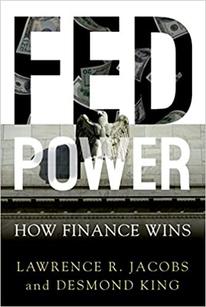The Role of Central Banks in Modern Economies
Finance has grown massively over the past few decades as a sector of the United States and western European economies. As finance (and financial inaction) has grown, it has become increasingly connected with government and particularly central banks.
The Capitalizing of Central Banks Project (CCBP) studies the development of central banks into increasingly autonomous and efficacious elements of the modern economies, their interventions in financial markets, the adaptations of finance, and the political consequences of central bank policy in such areas as income distribution and asset ownership.
The project is directed by Professor Lawrence Jacobs (Mondale Chair, Humphrey School of Public Affairs and Department of Political Science, University of Minnesota) and Professor Desmond King (Mellon Professor, Nuffield College, Oxford University). The project is funded by the Walter F. and Joan Mondale Chair and the Nuffield College Mellon Trust Endowment.
Research Projects
Fed Power: How Finance Wins
and Desmond King
Fed Power (Oxford University Press, 2016) is a hard-hitting critique of the Federal Reserve Bank's outsized role in American politics and life.
Drawing on comparisons to central banks in other countries, it shows how the Fed brazenly benefited the 1 percent at the expense of Main Street businesses and families during the 2008 financial crisis — and with very little criticism from elites in government and the media.
Fed Power concludes by outlining major reforms that the Fed needs if it is to establish a reputation for being impartial and accountable—and to be prepared to respond to the next financial crisis.
Fed Power: Reviews and media
Reviews
- Financial Times, June 18, 2016
- Perspectives on Politics, Review Symposium, Volume 15 (2017): 513-520
- Kirkus Review, March 2016
- Huffington Post, April 1, 2016
- MarketWatch, April 27, 2016
Media
“Why the Fed still needs fixing.” The Hill, May 19, 2016
Bringing in the Fed: How the Fed Generates Inequality
It is time to return the study of inequality in capitalist society to capital and its institutional guardian—central banks. This paper replaces the technocratic account of central banks and, specifically, the Federal Reserve Bank as a public good, with a political economy analysis based on its structural dependence on finance.
We examine the Fed’s two mechanisms for advantaging the super rich that are missing from accounts of inequality. The first was exposed by the Fed’s interventions in 2008-2009 that selectively benefited the financial sector and specific firms within it—policies that directly contributed to rising income inequality.
Second, the Fed’s conduct of monetary policy generates differential effects owing to the unique position of the super rich in capital markets due to their control of assets, investor knowledge, and financial networks. We conclude by recasting the study of inequality to incorporate the distinctive features of central bank policy and capital markets.
Current Project
The latest phase of the project focuses on interviewing American, British, and Canadian private bankers and hedge fund managers to identify how they respond to central bank interest rate adjustments and asset purchases.

